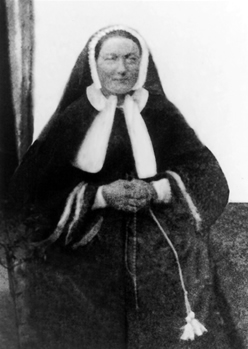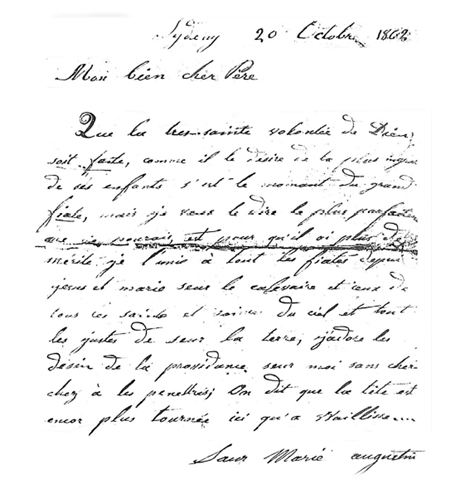06/11/2025
Needs of the Church, the Congregation and the world
06/11/2025
Prayer Intentions of the Pope
06/11/2025
Needs of the Church, the Congregation and the world
06/11/2025
Prayer Intentions of the Pope
04/09/2025
Needs of the Church, the Congregation and the world
04/09/2025
Needs of the Church, the Congregation and the world
04/09/2025
Prayer Intentions of the Pope






Our pioneers | The Vocation of the Pioneers
 Sr Marie Augustin was born at Crest-Voland in Savoie (France) on 16 March 1826. Like the other pioneers, on hearing the call of Bishop Bataillon for the missions in Oceania she volunteered and was accepted. At 31 years of age, she left with Marie Rose and Marie de la Merci from Bordeaux on 24 October 1858.
Sr Marie Augustin was born at Crest-Voland in Savoie (France) on 16 March 1826. Like the other pioneers, on hearing the call of Bishop Bataillon for the missions in Oceania she volunteered and was accepted. At 31 years of age, she left with Marie Rose and Marie de la Merci from Bordeaux on 24 October 1858.
After arriving in Wallis, she had only a month in Mata Utu, before being sent by the bishop to Lano, a farm, with Marie de la Miséricorde and Marie Rose. Fr Poupinel shares with Fr Yardin an early impression from Wallis of S. Marie Augustin: “she has simple tastes and she loves the poor, she is sincere” (Poupinel-Yardin, 02.09.1859, OPS I, 150). The work imposed on her at Lano was to care for the pigs and manage the farm. The whole cultural shock seems to have been too much. Her mental health, already fragile, suffered and deteriorated rapidly. She seems to have gone from one crisis to another that was a source of suffering for her companions, and especially for her herself. She speaks of being “in the crucible,” of “discouragement,” of “pain,” all of which she found hard to understand and accept. Writing to Fr Poupinel in the midst of her mental confusion and anguish, she says: “It is the moment to put my confidence in God and in Mary. How keenly I feel the pain at this time” (Augustin-Poupinel, 04.09.1861, Letter 7, §4*).
Understandably, Bishop Bataillon and Fr Poupinel decided in September 1861 that she would have to be repatriated. “The sentence is pronounced,” she wrote. She left for Sydney in May 1862 and for France in November of that year. She accepted to return to her family but letters written after this show a continuing interest in the mission and in the Society of Mary, “her family”.
Despite the limits of her missionary life and work in Oceania, Marie Augustin is one whom we claim as ‘a pioneer’ and who contributed in her own way to incarnating our charism. But it was a contribution with a difference - one of suffering and return to France as an apparent failure. As St Paul points out different members have different gifts, different services to render (cf. 1 Cor 12: 4, 5). For some, their gifts are seemingly restricted through suffering. Nevertheless, suffering has a mysterious but important part in the Christian life, and a power beyond human understanding. The very short missionary life of Marie Augustin in Wallis was to be in tears, in poverty and brokenness, in a humiliating sense of failure, but, in union “with Jesus in the garden of Olives”, as she wrote (Augustin-Poupinel, 04.09.1861, Letter 7, §4*). Her particular contribution to the TOMMO, and to the church in Oceania, is not to be underestimated.
For her life after 1862, she found God had another plan. It was “to extend the kingdom of Jesus Christ and to make Mary known” in another way, namely, by using her circumstances to do all in her power for mission - praying, keeping her interest in the sisters and the people, writing, sending money and parcels to Oceania, and by working in her own local church. She remained a member of the Third Order, convinced she was a “child of Mary,” and happy to describe herself as a “marist exile” until her death in 1896 (Augustin-Poupinel, 11.04.1871, Letter 11, §2*).

May the very holy Will of God be done as He desires it from the most ungrateful of his children. It is the moment of the great fiat, but I want to say it as perfectly as I can. It is in order to have more merit. I unite it to all the fiats since Jesus and Mary on Calvary, to all these saints in heaven and all the faithful on earth. I adore the designs of Providence for me without seeking to enter into the reason. They say my head is more disturbed here than it was in Wallis… (Augustin-Poupinel, 20.10.1862*).